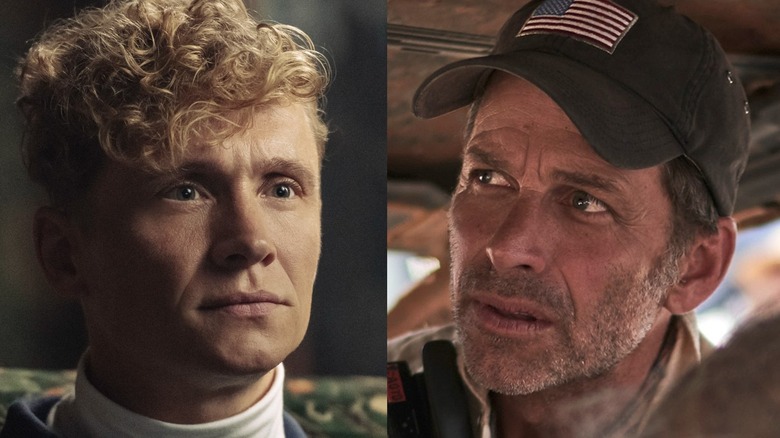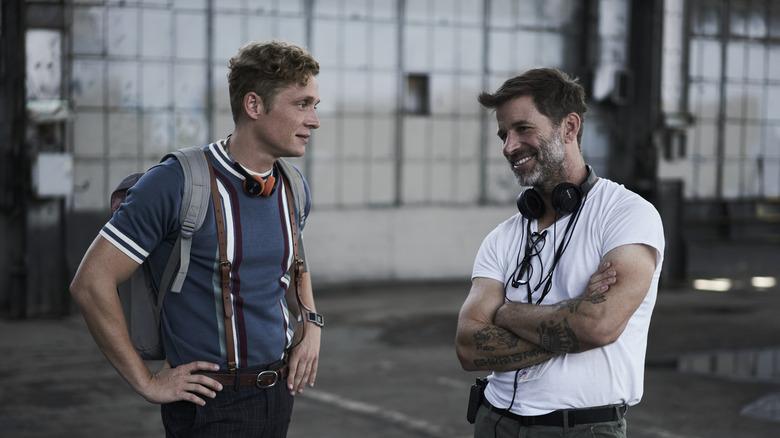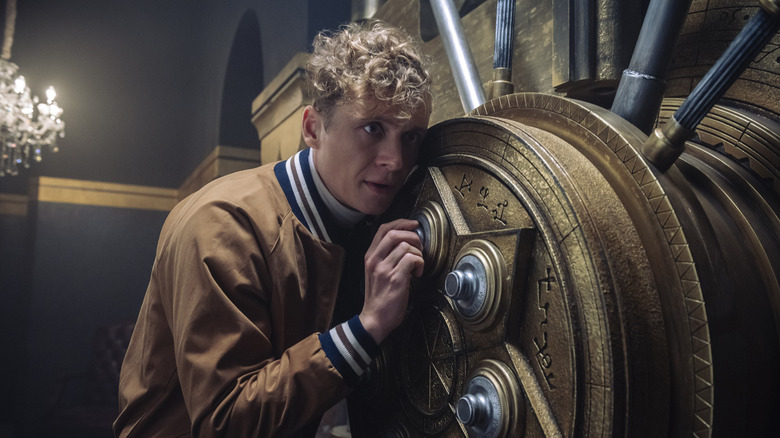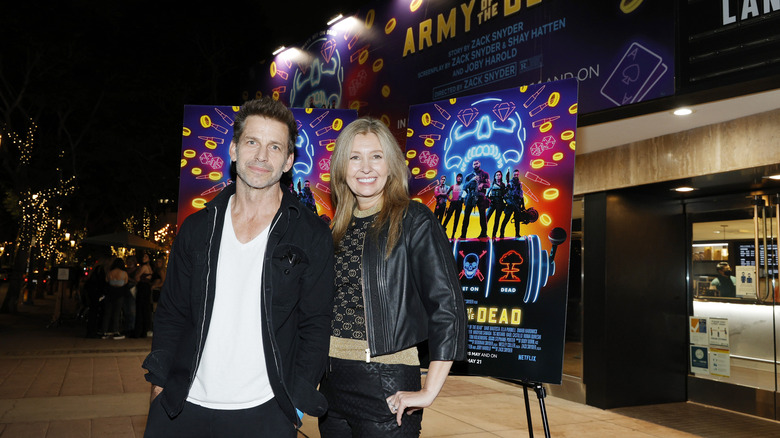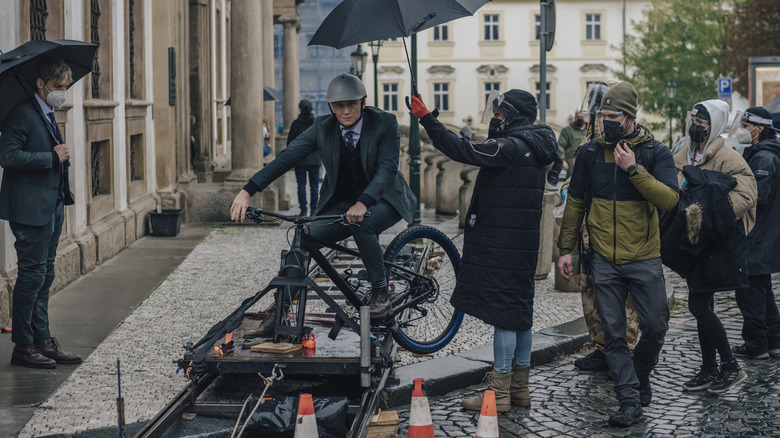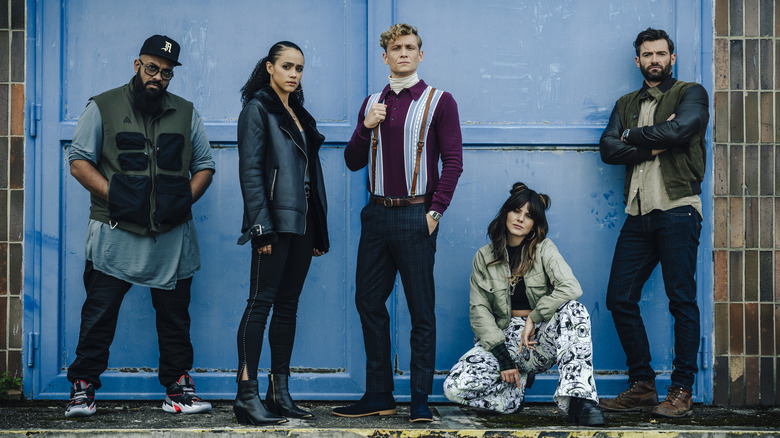Matthias Schweighöfer And Zack Snyder Break Down Army Of Thieves - Exclusive Interview
It's been an amazing year for writer-director Zack Snyder, beginning with the release of "Zack Snyder's Justice League" — the definitive four-hour version of his DC superhero opus. And while the film gave Snyder's faithful fans plenty of cinematic wonders to pore over, the director had much more in store: A few months later he released his zombie heist thriller "Army of the Dead."
Much like his take on the superheroes in his version of "Justice League," Snyder saw endless possibilities for stories about his characters in "Army of the Dead." As a result, the filmmaker, his wife and production partner Deborah Snyder, and screenwriter Shay Hatten put the prequel "Army of Thieves" and anime-style series "Army of the Dead: Lost Vegas" into play while "Army of the Dead" was still in production.
Snaring the potential the crew witnessed in "Army of the Dead" cast member Matthias Schweighöfer, the Snyders and Hatten built "Army of Thieves" around Schweighöfer's effervescent safecracker character, Ludwig Dieter. However, since Snyder was in postproduction on "Army of the Dead," the team utilized the prolific German actor's experience as a director in his home country and hired Schweighöfer to helm "Army of Thieves" as well.
New and streaming exclusively on Netflix, "Army of Thieves" is a unique prequel in that it takes place in a different genre than "Army of the Dead." Set in Europe as the early days of the zombie epidemic play out through television reports from Las Vegas, "Army of Thieves" is largely a heist comedy. Naturally, the film is punctuated by the same comedic flair Schweighöfer brought to "Army of the Dead"; however, in "Army of Thieves," we meet his character in a mundane job as a bank teller obsessed with the cracking the Götterdämmerung — one of four legendary safes forged by designer Hans Wagner. Ludwig is recruited by Gwendoline (Nathalie Emmanuel), an expert thief, to join her crew (Stuart Martin, Guz Khan, and Ruby O. Fee) in a bid to crack Wagner's three other safes, which are stationed across Europe.
In an exclusive interview with Looper, Snyder and Schweighöfer talked about how "Army of Thieves" came together, and Snyder revealed how his version of "Justice League" informed the expansion of the "Army of the Dead" universe.
Pointing Schweighöfer in the right direction
Sorry to embarrass Matthias right away, but look, Zack, he was brilliant in "Army of the Dead." At what point did you, Deborah, and your other producers say, "You know, we really need to have this guy calling the shots for 'Army of Thieves'? Was there a particular "Eureka!" moment filming "Army of the Dead" where you went, "We need to get this guy now"?
Zack Snyder: I don't know if there was a "Eureka!" moment necessarily, like we were, "He needs to be the director." I think to me that it was just a good, natural — it was really a natural evolution. He was doing such a great job acting and then we thought, "Okay, Matthias is also a director, and for this character at this point, I felt like, unless I was directing the movie, no one knows the character better than Matthias." Because of the experience I knew he did have, it seemed like a great way to go, and he was willing to do it, thank God. And so it worked out great.
Finding the right combination to represent Dieter, past and present
Matthias, I know there was some production crossover between the end of "Army of the Dead" and the beginning of "Army of Thieves." Was it strange to push a reset button on the character of Dieter to direct the prequel without thinking of how things end for him in "Army of the Dead"? Or did knowing Dieter's fate help with the urgency of what's going on in "Army of Thieves"?
Matthias Schweighöfer: We were really happy to really bring Dieter back fast [for the prequel] because he was so entertaining and amazing in "Army of the Dead." And then when Zack and Shay choose the genre for "Army of Thieves" and were like, "Let's deconstruct the heist and romantic comedy thing," it was cool to know what his fate was in the "Army of the Dead" because it helped us give him a bit more weird, funny moments, and character weirdness. So, we've been really happy and were really lucky. I was happy to know his fate and I was super happy that the prequel happened that fast.
Army of Thieves deepens the Army of the Dead narrative
Zack, looking at "Army of Thieves" now, does it make you look at "Army of the Dead" in a different sort of light? I mean, it just seems to me that after seeing this, obviously we're filling in some blanks now and it seems to give more depth and complexity to "Army of the Dead."
Zack Snyder: I do. We're in the middle of the animated prequel, which will be about another two hours when the series is all done. More "Army" universe keeps getting filled out, and lines are getting painted in everywhere. So, yeah, it does sort of speak to me, anyway, to this ever-growing universe and that there are still a lot of stories to be told in the "Army" universe. I think what's evidenced is that you can't go too deep into this world, because I do think you're right, Dieter's character ... you really understand by the time you get to "Army of the Dead," you completely understand why he's involved, why he would do this, you know. It's a no-brainer that he would go with them to find the Götterdämmerung. Right?
For anyone who sees "Army of the Dead" and goes, "I don't know ... that safecracker doesn't have enough backstory and enough motivation to go on this journey into a zombie-infested Vegas" — after seeing "Army of Thieves" they'll be like, "Okay, I was wrong. Clearly, he would've gone no matter what!" So yes, I think it's real fun.
Making a heist film the European way
I think it's wonderful, Matthias, being from Germany, that you give "Army of Thieves" a sense of European flair. What is it that separates European heist films from American heist films?
Matthias Schweighöfer: The difference is it's based on Norse mythology and that we have "Der Ring des Nibelungen" ("The Ring of the Nibelung") as an opera that tells the story about these epic four safes. It's an opera by Richard Wagner. That's what I love about this and what makes it a European thing. It's from this old composer with these big crazy hours of music and a story, as well as a backstory. I love that we had a chance to create ["Army of Thieves"] around this foundation. It's European and the heart of our film, and I love that. That it's about these stories and people in the world can say, "Oh, wow, that's an interesting part of the history of 'Army of the Dead.'"
Zack Snyder: Plus, Europeans are better at the heist films is because they have more cobblestone streets. There's something about the sound of those. I don't know what it is, but it is. I'm sure that's what it is.
The Snyder Cut of Justice League helped the filmmaker realize the possibilities for the Army universe
Zack, I just love how fans have embraced your definitive four-hour version of "Justice League." I'm wondering if there was anything specific that you learned while making "Justice League" that you applied to the making "Army of Thieves" and "Army of the Dead"? I think filmmaking is a continual learning process.
Zack Snyder: Yeah, I think if you look at what we're trying to do with "Army of the Dead," "Army of Thieves," "Army" animated — the whole "Army" universe — the thing I think that I got from doing "Justice League" is that sort of epic world-building; that sort of epic mythological, kind of multi-layered world of making something that's rich for the fans that they can really enjoy a full meal, and they can keep eating until you explode. The fun of that and the joy from really filling in all the corners of the DCU was the same. That experience really made me go, like, "God, I really want to whole cloth something like that," and [the "Army" universe] has given us that opportunity in a really fun way. We hope to continue doing it.
"Army of Thieves" is streaming exclusively on Netflix.
This interview was edited for length and clarity.
